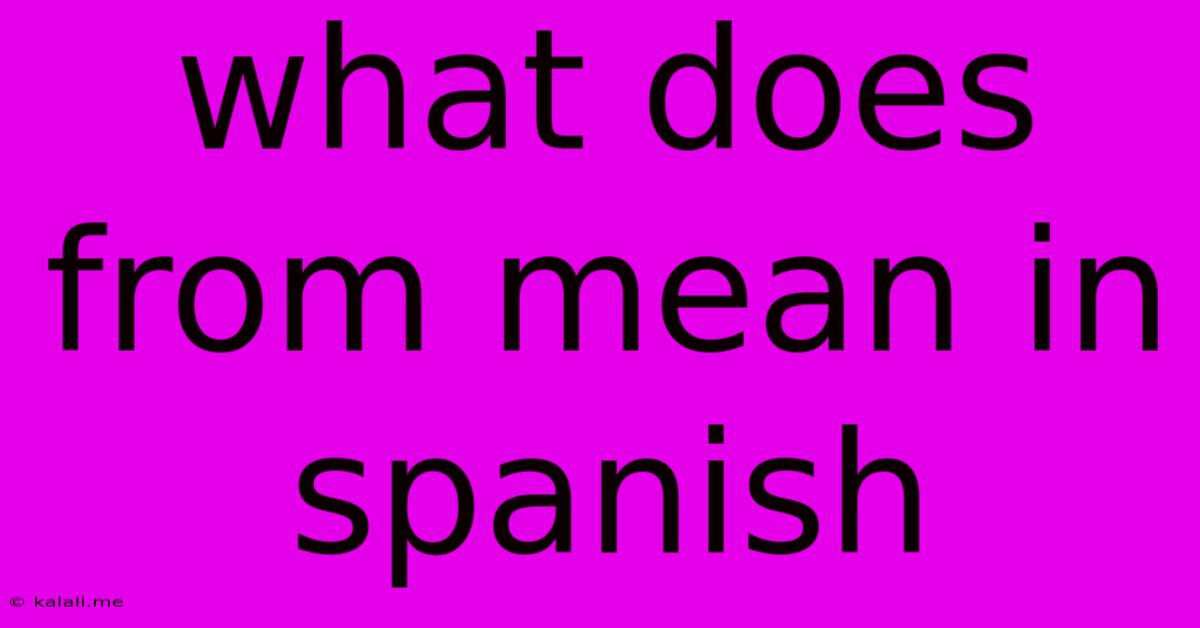What Does From Mean In Spanish
Kalali
May 24, 2025 · 3 min read

Table of Contents
What Does "From" Mean in Spanish? A Comprehensive Guide
Understanding prepositions is crucial for mastering any language, and "from" in Spanish presents some interesting nuances. This guide will explore the various ways to translate "from" in Spanish, depending on the context. We'll cover the most common translations and offer examples to solidify your understanding. This will help you write and speak Spanish with greater accuracy and fluency.
The Most Common Translations of "From"
The most frequent translations of "from" in Spanish depend heavily on the context of the sentence. Here are the key options:
-
De: This is the most common and versatile translation of "from." It's used to indicate origin, possession, or material.
- Origin: "I'm from Spain." → "Soy de España."
- Possession: "A book from my friend." → "Un libro de mi amigo."
- Material: "A table made from wood." → "Una mesa hecha de madera."
-
Desde: This word translates to "from" or "since," indicating a point in time or space. It emphasizes the starting point of a continuous action or process.
- Time: "From Monday to Friday." → "De lunes a viernes" (Note: 'de' works here, but 'desde' adds emphasis to the starting point.) "From 3 o'clock onwards." → "Desde las tres en adelante."
- Space: "From here to there." → "Desde aquí hasta allá."
Understanding the Nuances: When to Use "De" vs. "Desde"
The choice between "de" and "desde" often hinges on whether you're referring to a static point or a continuous process. Consider these examples:
- "I come from a small town." (Static origin) → "Vengo de un pueblo pequeño." ("De" is perfectly suitable here.)
- "I've been working from home since March." (Continuous action starting at a point in time) → "He estado trabajando desde casa desde marzo." ("Desde" emphasizes the ongoing nature of the work starting from March.)
Other Ways to Express "From" in Spanish
While "de" and "desde" cover the vast majority of cases, certain contexts might require alternative phrasing.
- Origin (people): Instead of saying "from" with a person's name, you might use "de parte de" (on behalf of) or other phrasing depending on the context. For example: "A message from John." can also be "Un mensaje de parte de Juan".
- Derived from: When talking about something being derived or originating from something else, you might use expressions like "procedente de," "originario de," or "derivado de."
- Removal: In the sense of "remove something from," verbs like quitar, sacar, or retirar are used, with the preposition "de" often still needed. "Remove the book from the shelf" translates as "Quita el libro de la estantería."
Examples to Illustrate the Usage:
To solidify your understanding, let's look at a few more examples:
- "The letter is from my mother." → "La carta es de mi madre."
- "I haven't seen him since Monday." → "No lo he visto desde el lunes."
- "This recipe is from my grandmother." → "Esta receta es de mi abuela."
- "The view from the top was breathtaking." → "La vista desde la cima era impresionante."
- "He's from a wealthy family." → "Él proviene de una familia adinerada." (using a different verb to imply origin)
By understanding the subtle differences between "de" and "desde," and recognizing other potential translations, you'll significantly improve your ability to use "from" correctly and naturally in Spanish. Remember to consider the context and the nuance you want to convey for accurate and effective communication.
Latest Posts
Latest Posts
-
How To Prove Function Is Onto
May 24, 2025
-
Mounting A Ceiling Fan On A Vaulted Ceiling
May 24, 2025
-
Can Cement Board Be Used Outdoors
May 24, 2025
-
Mysql Add Column If Not Exists
May 24, 2025
-
7 Days To Die Where To Find Blueberries
May 24, 2025
Related Post
Thank you for visiting our website which covers about What Does From Mean In Spanish . We hope the information provided has been useful to you. Feel free to contact us if you have any questions or need further assistance. See you next time and don't miss to bookmark.